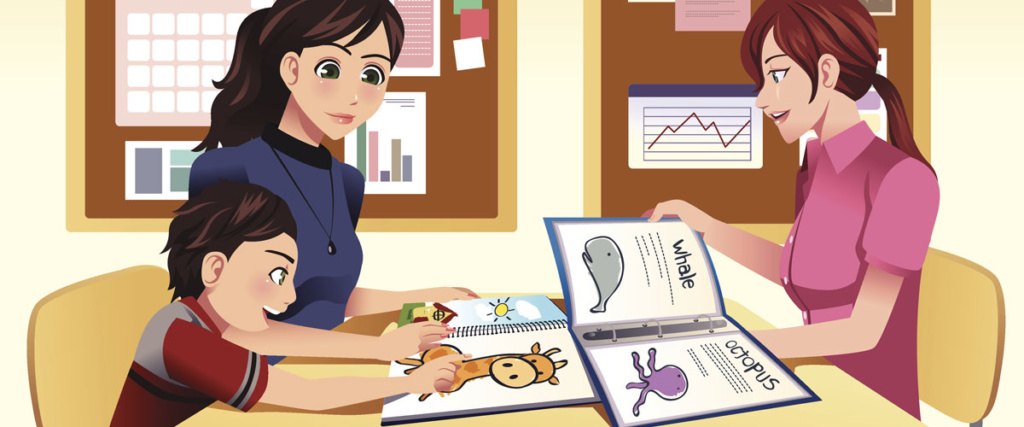It’s almost time for parent-teacher conferences. Next to the tango, there is no dance more fraught with peril. How can parents make the best use of their brief time with their child’s teacher? Several scholars, educators and parents have put their minds to topics that come up during these conversations and have written books that can inform parents who have questions.
The Essential Conversation: What Parents and Teachers Can Learn from Each Other
One book that addresses the issue of parent-teacher relationships with depth and sensitivity is The Essential Conversation: What Parents and Teachers Can Learn from Each Other by Sara Lawrence-Lightfoot. This is not a quick, magazine-article-type read. This book asks readers, whether they are teachers or parents, to examine their own experiences in the classroom and their recollections of parent-teacher interactions.
This could be an especially helpful book for anyone who faced difficulties with school during their own formative years, as well as for anyone who has a tendency toward unyielding expectations for their student and his or her school. With chapters entitled “Natural Enemies,” and “Crossing the Line of Objectivity,” this book reads in part as a challenge and in part as an entreaty to parents, teachers and school administrators to make conferences meaningful and mutually respectful.
How is My First Grader Doing in School?
How is My First Grader Doing in School? by Jennifer Richard Jacobson is part of a series that addresses grade-level work and expectations throughout the elementary years. While the book was written pre-common core and the curriculum has since changed, the recommendations in the chapter “Working With Your Child’s Teacher” provide concrete suggestions that apply regardless of the grade level or curriculum.
With bulleted lists of questions to ask your child in order to prepare for the conference, this chapter coaches you on the best way to begin a dialogue with the teacher.
Similarly, the author suggests questions designed to elicit richer feedback from the teacher than “Your child is a pleasure to have in class.” With additional information on dealing with specific problems that may come up between teachers and students, and an explanation of student assessment, this book provides useful tools for parents seeking better avenues of communication and understanding with educators.
Harvard Family Research Project at the Harvard Graduate School of Education
An excellent source of information on parent-teacher communication can be found online in a series of tip sheets from the Harvard Family Research Project at the Harvard Graduate School of Education (hfrp.org). Principals, teachers and parents can find clear objectives and suggestions for all involved parties. Broken into very brief sections such as “What to expect,” “What should you talk to the teacher about?” and “How should you follow up?,” the parent tip sheet is written in such a way that it provides clear, succinct guidance. Parents who read all the tip sheets will have the advantage of understanding what is expected of teachers during the conferences. Search the site for “tip sheet.”
Advice from Professionals
For more advice for parents, I consulted veteran English teacher Robert Keim, who said the key to successful parent-teacher conferences is to come prepared. “By the time parent-teacher conferences take place, parents shouldn’t be surprised,” Keim said. “Think about what questions you have, use the parent portal so you know your student’s grades before you arrive, and keep it short.”
Keim said that one potential pitfall is when parents and teachers have serious issues to discuss, and the student is present for the initial conversation. He recommends that the student be brought in to a follow-up meeting as plans to address the concerns of the parents and teacher are being formulated and implemented.
Similarly, if a parent anticipates that a longer conversation regarding a student needs to take place, it’s best to schedule it at a time other than parent-teacher conferences, when the waiting area may be filled with other parents, limiting both time and confidentiality for an important discussion.
Keim said it’s important that parents not become discouraged, even if the student has always faced some academic or behavioral issues. Parent-teacher conferences have often focused on correcting negative situations.
“Keep going,” he said. “Sometimes something can click, even in high school, that turns things around for a kid.”
He has found the most critical factor in students’ success is for parents “to try to have candid, open conversations with their child about how things are going.” This begins with dinner-table conversations in elementary school and should continue as they progress through school.
One strategy is to ask, “What was the best thing that happened at school today? What was the worst?” With some preparation and good advice, maybe your answer to that question will be, “The best thing that happened today was the conversation at parent-teacher conferences.”



